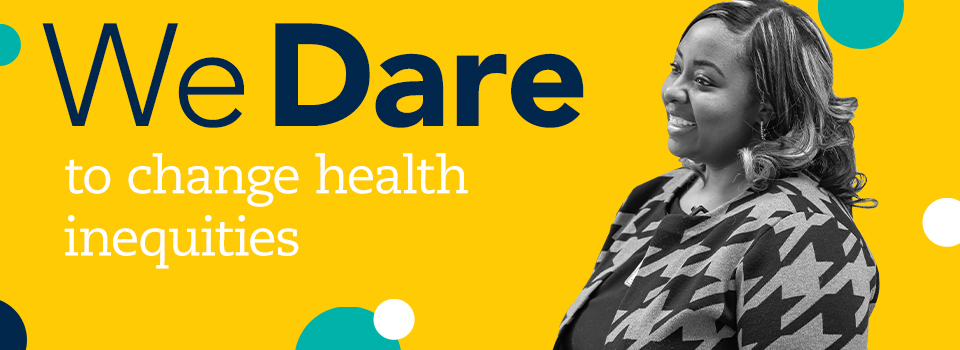We Dare to change health inequities

How can nursing research help us achieve health equity?
One in three women in the U.S. have hypertension. For African American women, the rates are even higher, and they’re coupled with a greater risk for stroke, renal disease, diabetes and other health problems.
Before Lenette Jones became an assistant professor at the University of Michigan School of Nursing, she was a sophomore in U-M’s Undergraduate Research Opportunity Program, where her first research assignment would set the course for her scholarly work as a behavioral nurse scientist.
The project focused on hypertension in African American women. Jones’ responsibilities included taking participants’ blood pressure and conducting a survey, so she practiced her skills on friends and family. When she checked her grandmother’s blood pressure, she was upset by what she saw.
“Her blood pressure was high, like 170/100,” Jones said. “In class I was learning that normal blood pressure was below 140/90 and that there were complications of higher blood pressure like strokes.”
After graduation, Jones began working in an intensive care unit and quickly developed concerns about how hypertension was being treated.
“We would get a patient’s blood pressure down and send them home with medication, but they usually came back,” she said. “Often, especially among African American women, their outcomes were not good. I started to wonder why we are addressing this in the ICU. Interventions need to happen earlier.”
Jones was determined to find a better way. She returned to the U-M School of Nursing to pursue master’s and Ph.D. degrees, focusing her research on hypertension in African American women.
Her program of research is focused on uncovering the biological, psychological, social and physical mechanisms of self-management interventions to examine how health information behavior can be enhanced to support blood pressure self-management. In her current studies, Jones is designing and pilot-testing interventions, including a mobile app, to improve self-management of blood pressure among African American women.
“I want to understand how women seek, share and use information to self-manage their blood pressure, because women who share health information are more likely to use it and become role models for other women.”
Jones is also focusing on brain-behavior connections. Specifically, she’s looking at regions of the brain and activity associated with self-management behavior and decision making, using neuroimaging to explore the processes associated with behaviors such as diet, exercise and medication-taking.
At the U-M School of Nursing, Jones is creating opportunities for undergraduate students to get involved in this research, mentoring those who are equally alarmed and inspired by the statistics around hypertension in African American women. She understands that nurses have a unique ability to provide patient-centered care and bring a more thoughtful approach to treating this inequitable condition.
“We need to meet patients where they are. Nurses are in the best position address a patient’s individual needs and develop solutions based around their life.”
“I realized that interventions needed to be delivered sooner.”
— Lenette M. Jones Ph.D., ACNS-BC, RN
Assistant Professor






